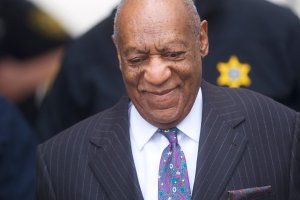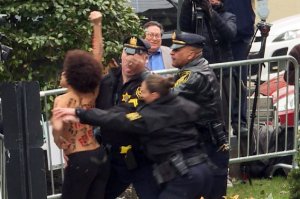Bill Cosby paid $3.38 million to the woman who said that he drugged and assaulted her as part of a 2006 civil settlement, prosecutors said in opening statements of his trial on Monday.
The number was made public for the first time on Monday as Cosby returned to court for his trial on three counts of aggravated indecent assault. Cosby, 80, has pleaded not guilty to the charges.

The core of the trial is the dueling “he said, she said” dynamic between Cosby and Andrea Constand, a former Temple University employee who says that Cosby drugged her and then assaulted her at his home in 2004.
Cosby’s defense attorneys have argued that he and Constand had a consensual sexual relationship. Their opening statements are expected Tuesday morning.
Constand reported the alleged assault to police in 2005, but no criminal charges were filed at the time. She and Cosby settled a civil lawsuit in 2006.
Although parts of that settlement have been made public — including Cosby’s admission that he got prescription sedatives to give to women he wanted to have sex with — the price tag of that agreement had remained a secret.
In opening statements, Montgomery County District Attorney Kevin Steele said Cosby, a powerful Temple University trustee, built up trust with Constand and then pressured her to take pills that incapacitated her.
“This case is about betrayal, and that betrayal leading to the sexual assault of a woman named Andrea Constand,” he said.
With little to no forensic evidence, the prosecution’s case relies on Constand and her testimony. Cosby’s defense attorneys plan to try to undermine her testimony by arguing how “greedy” she was in a 2006 civil settlement with Cosby.
This is the second trial for Cosby on these charges. Last June, Montgomery County Judge Steven O’Neill declared a mistrial when jurors could not come to a unanimous verdict on any of the charges against Cosby.
Protester arrested

Just before Cosby walked into court Monday morning, a topless protester with “Cosby rapist” and women’s names written on her body jumped a barricade near Cosby and began chanting. She was tackled by police and detained.
The protester, identified as Nicolle Rochelle, 39, of Little Falls, New Jersey, was charged with disorderly conduct, according to the Montgomery County District Attorney’s Office.
Rochelle appeared in four episodes of “The Cosby Show” from 1990-1992 in a recurring role, according to Carolyn Anthony, who represents Rochelle. Rochelle later said she was acting on behalf of Femen, a European women’s movement whose members paint messages on their topless bodies to protest the patriarchy, and to reclaim the bodies of women who have been disempowered through sexual assault.
The anticipated opening of Cosby’s retrial in a Pennsylvania courthouse was delayed for several hours on Monday due to a potential issue with a juror. Defense attorneys on Friday filed a motion to dismiss one juror. They say the juror made a comment indicating the TV icon is guilty.
Differences from previous trial
But this case is different in several ways from the prior trial, both legally and culturally.
The allegations against Cosby stretch back more than a decade, but the trial takes place in a cultural moment vastly different from the one in which the first trial took place last year.
The rise of the #MeToo movement, led by women speaking out about harassment and assault, has caused male entertainment heavyweights like Harvey Weinstein, Matt Lauer and Kevin Spacey to fall from grace. Yet while those stars have faced professional repercussions, Cosby is currently the only once-powerful celebrity facing criminal charges.
Cosby, the star comedian once known as “America’s Dad” for his portrayal of Cliff Huxtable on “The Cosby Show,” will put the #MeToo movement to a major legal test.
If convicted, he could face up to 10 years in prison.
Several changes since the previous trial are likely to help the prosecution’s case, legal experts said.
The #MeToo movement, which dominated the news since last fall, and its influence on jurors’ views may make jurors more likely to believe accusations against a powerful celebrity. Prospective jurors were asked for their thoughts on the #MeToo movement during jury selection, as prosecutors and defense attorneys seated the jury of seven men and five women.
In addition, at the prior trial, prosecutors called up to the stand one woman who said Cosby had previously drugged and assaulted her, as prosecutors attempted to show that Cosby had a pattern of misconduct. This time, the prosecution will be allowed to seek testimony from up to five women who have accused Cosby of sexual misconduct in prior incidents.
Reality TV actress and former supermodel Janice Dickinson may be one of those prior acts witnesses, according to her attorney Lisa Bloom.
“Knowing that she might be called as a witness in the Cosby trial has been scary and stressful for Janice. But we’ve discussed it in depth, and if called, she is ready, resolved and centered,” Bloom said. “The many reasons to say no to this are outweighed by the one simple reason to say yes: because it’s the right thing to do.”
Cosby also has new attorneys for this trial. The defense team is now led by Tom Mesereau, who is most famous for successfully defending Michael Jackson in his child molestation trial.
One legal change since the last trial may bolster Cosby’s defense. Defense attorneys will be allowed to seek testimony from a Temple employee who claims Constand once admitted she could lie about being assaulted by a high-profile person and then collect a lot of money.





















